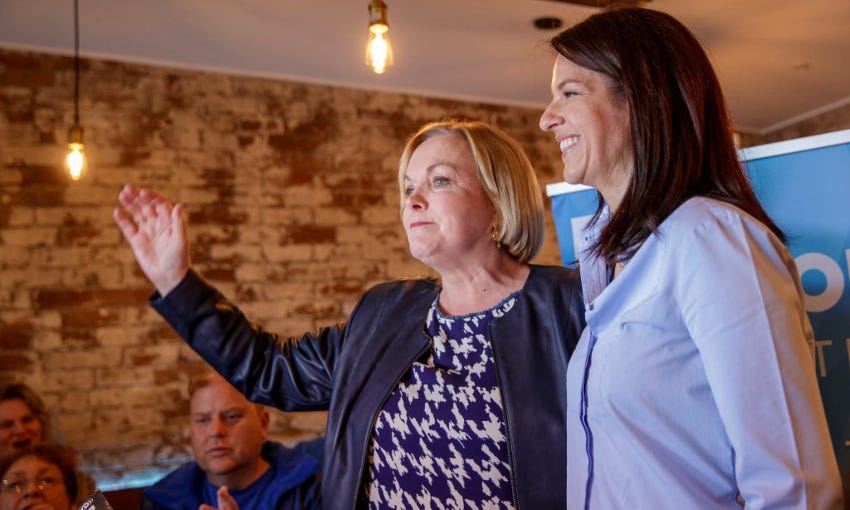National pushes new Covid visa for migrants
Recent reports suggest desperately needed skilled migrants are thinking about leaving
Good morning and welcome to The Bulletin for Thursday 5 August, by Alex Braae for The Spinoff. Presented in partnership with Z Energy.
In today’s edition: National pushes new Covid visa for migrants, another storming set of data on unemployment, and Radio NZ pinged for using hacked DHB data in story.
Image: National leader Judith Collins and immigration spokesperson Erica Stanford during the 2020 election (Getty Images)
The National party has launched a policy aimed at keeping skilled migrants in New Zealand, and giving them certainty about their future. Stuff's Henry Cooke reports it would take the form of a "Covid Contribution Visa", which would involve clearing the hefty backlog of residency applications currently in front of Immigration NZ. The other aspect of the policy would be de-coupling migrant worker visas from specific employers, instead people would be bonded to regions. "We need to offer our migrant workers here a pathway to residency. These are our dairy farmer workers, aged care workers, truck drivers, construction workers and hospitality staff who are in New Zealand because there was a skills shortage," said party leader Judith Collins. Decoupling migrant workers from employers is something migrant rights activists are desperate to see, as a mechanism to prevent abuse.
The government will be under pressure to look hard at the policy, if for no other reason than it's a good idea. It would solve several seemingly intractable problems, massively improve the lives of countless people, and be good for the economy. Collins didn't go all the way in proposing simply giving residency to all migrant workers already in limbo in the country, but was open to discussing it. It's refreshing to see this kind of work taking place from the opposition, especially as National's week has so far been dominated by some bizarre culture-war nonsense.
The way the government has been handling this issue so far has been to repeatedly just kick the can down the road, and extend temporary visas. But on issues like split families who aren't being reunited, or the migrant workers in limbo, current government policy is ruining lives. A question was asked in parliament yesterday of minister Kris Faafoi about why the backlog in residency applications had blown out so much, and he put it down to a combination of Covid and an increase in demand. Faafoi also indicated the government is "looking at options available to us" on the issue. Well, here's one option.
But it seems unlikely to be adopted, because it also highlights wider questions around the current approach to immigration with the closed borders. Earlier this year, a record drop in migration was recorded, which can largely be attributed to closed borders – but it's not at all clear this government would ever choose to go back to high migration settings. That's in contrast to Canada, which the Globe and Mail (paywalled) reports is still pushing for record high immigration levels despite their closed borders, as part of a wider country consensus that high immigration is desirable.
Another incredible set of figures has been delivered on unemployment, with it falling to just 4%. Interest reports this was much better than expected for the quarter (not to mention the predictions over the last year of double-digit joblessness) and the "underutilisation" rate fell sharply as well. Wage growth is also ahead of expectations. The numbers have led to widespread predictions the Official Cash Rate will be going up sooner rather than later.
Radio New Zealand has been pinged by the High Court for using hacked Waikato DHB data for a story, reports Radio NZ. The material was sent to media, ostensibly as part of a plan from the hackers to add pressure to their ransom demands. The story from RNZ involved a child who spent nine weeks in hospital because Oranga Tamariki couldn't find a suitable placement. The privacy commissioner had heavily criticised RNZ's decision to use the hacked material for newsgathering.
Every dollar our members contribute directly funds our editorial team and is devoted to ensuring we do more. Support the team. Donate today!
A major culture investigation has found severe failings at Mediaworks, and the new boss is promising to implement changes. The Spinoff reported on the review conducted by Maria Dew QC, which found multiple examples of sexual harassment and misconduct, bullying, discrimination, and other examples of poor organisational culture. Worse, there were findings that allegations of such had not been adequately investigated. CEO Cam Wallace said he "would like to unreservedly apologise on behalf of MediaWorks to current and former staff for MediaWorks’ failures over the past years".
An Australian-based analyst is aghast at a plan to stop refining fuel in New Zealand, saying it leaves the country very vulnerable. Radio NZ's Phil Pennington has been covering the story, ahead of a crucial Refining NZ vote this Friday on whether to turn the Marsden Pt facility into an import-only terminal. Northern Australia Strategic Policy Centre Dr John Coyne said the likely decision (to stop refining) is "naive", and added that "they're buying into a very dated view of globalisation, and they certainly haven't learned the lessons from Covid-19, around secure supply chains and national resilience." Meanwhile Checkpoint's Nita Blake-Persen reports from Northland that Marsden Pt workers in line for redundancy are feeling frustrated and abandoned. A disclosure – Z Energy, our partners on The Bulletin, are 15.4% shareholders in Refining NZ.
A story about how local politics works that I found very interesting to write: You might not have heard of the Coasters Club, a 27,000 facebook community that is extremely popular on the West Coast. Mostly it's benignly positive stuff about the people of the Coast, but the page is also wholly owned by the Westland District mayor, who uses it as an outlet for political campaigning and promoting industries he believes in. Fundamentally, the story is about who gets to speak on behalf of communities, and what they use that platform to say – you can have a read of it here.
Got some feedback about The Bulletin, or anything in the news?
Get in touch with me at thebulletin@thespinoff.co.nz
Right now on The Spinoff: Emma Vitz presents data showing an incredible number of people, even in wealthy demographics, are avoiding the dentist. Laura Walters writes about how difficult it is to move to Wellington at the moment. The latest Conversations that Count podcast looks at food security and supply chains. Jo Spratt of Oxfam argues New Zealand should give vaccines away to other countries for free. Jihee Junn farewells Auckland's favourite Korean pancake hole-in-the-wall. Emily Writes pays tribute to discontinued drink line Bernadino. Max Olijnyk writes about the complicated feelings of seeing formerly counter-cultural skateboarding being given approval from officialdom at the Olympics. And the tremendous Lucy Blakiston from SYSCA is the latest guest on First.
For a feature today, a look at Indigenous management of the Amazon, and dangerous moves by the Brazilian government to strip it away. Firstly, this story from Reuters is a sobering look at a bill going through Brazil's parliament to open up commercial exploitation on Indigenous reservation land. And for the longer read, this piece from Mongabay looks at how much better the environmental outcomes can be when Indigenous property rights are respected. Here's an excerpt:
In fact, [Brazilian president Jair] Bolsonaro uses the low number of Indigenous people inhabiting reserves today — low populations often the outcome of past horrific violence and even genocide — as an excuse for depriving them of their lands. In 2015 he declared: “The Indians do not speak our language, they do not have money, they do not have culture. They are native peoples. How did they manage to get 13% of the national territory?” And in 2017 he said: “Not a centimeter will be demarcated… as an Indigenous reserve.”
The Indigenous territory of Urubu Branco, cited by Baragwanath and Bayi as a stellar example of effective state action, is a case in point. Under the Bolsonaro government it has been invaded time and again. Although the authorities have belatedly taken action, the Apyãwa (Tapirapé) Indigenous group living there says that invaders are now using the chaos caused by the pandemic to carry out more incursions.
Some not-Olympics sport to watch this weekend: The Mainland Tactix will be heading to Auckland this Sunday to try and take down the Northern Mystics in the ANZ Premiership final. Stuff reports the Tactix got there after previously going to Invercargill and beating the Southern Steel, so they can clearly handle the road. It will be a first-time champion no matter who wins the final.
That's it for The Bulletin. If you want to support the work we do at The Spinoff, please check out our membership programme.







